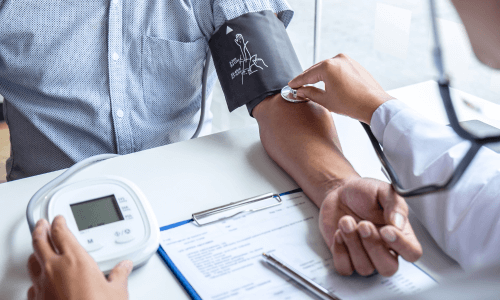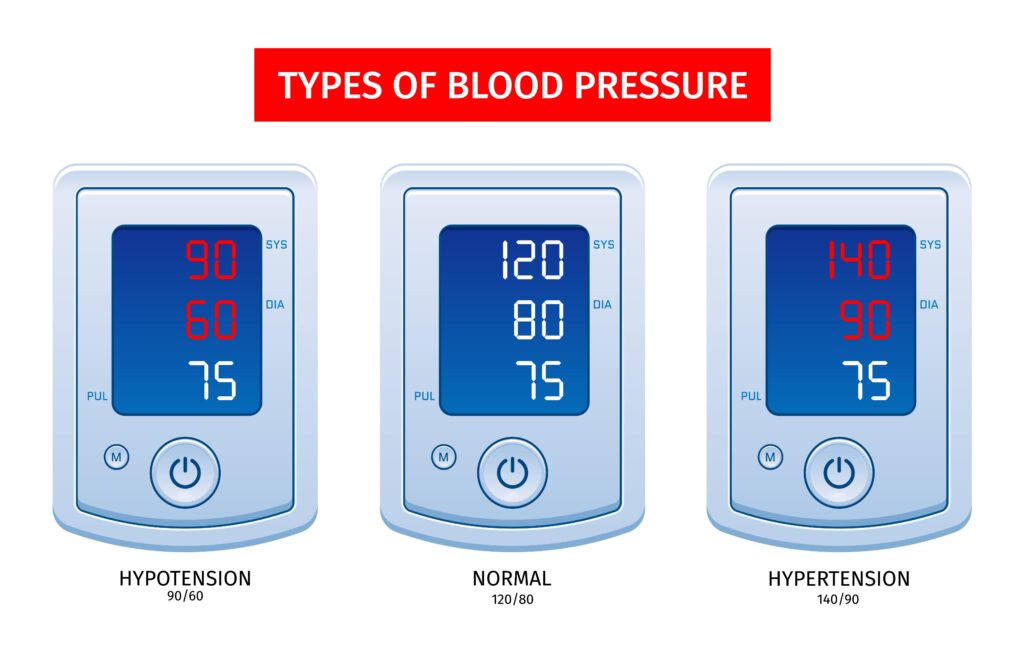
Hypertension, commonly known as high blood pressure, is a significant health concern affecting millions of people worldwide. It’s often referred to as the “silent killer” because it can silently damage your body for years without noticeable symptoms. At Tampa Internal Medicine, we believe that awareness and understanding are key to preventing and managing hypertension effectively. In this blog, we explore the symptoms, causes, and risk factors associated with this condition.
What Is Hypertension?
Hypertension occurs when the force of blood against the walls of your arteries is consistently too high. The two primary measurements used to diagnose high blood pressure are systolic and diastolic blood pressure:
Systolic Pressure: The higher number in a blood pressure reading represents the force of blood during heartbeats.
Diastolic Pressure: The lower number represents the force of blood when the heart is at rest between beats.

A typical blood pressure reading is expressed as “120/80 mm Hg,” where 120 is the systolic pressure, and 80 is the diastolic pressure. Hypertension is usually defined as blood pressure consistently equal to or higher than 130/80 mm Hg.
Preeti Kallu is an internist in Tampa, Florida
Symptoms of Hypertension:
Hypertension is often asymptomatic, especially in the early stages. This makes regular blood pressure monitoring essential for early detection. However, as blood pressure rises to severe levels, some individuals may experience symptoms such as:
Headaches: Severe and persistent headaches can be a sign of hypertension.
Shortness of Breath: Difficulty breathing, particularly during physical activity.
Nosebleeds: While less common, some individuals with high blood pressure may experience frequent or severe nosebleeds.
It’s important to note that these symptoms are not unique to hypertension and can be associated with various other medical conditions. Therefore, if you experience any of these symptoms or suspect you have high blood pressure, it’s crucial to consult a healthcare provider for accurate diagnosis and management.
Causes and Risk Factors: High blood pressure
The exact cause of hypertension often remains unclear, but it can result from various factors and conditions. Understanding these causes and risk factors is essential for prevention and management. Some common contributors include:
Lifestyle Factors:
Diet: A diet high in salt, processed foods, and an excess of unhealthy fats can contribute to hypertension. Sodium, a key component of table salt, can lead to water retention and increased blood pressure.
Physical Inactivity: Lack of regular physical activity is associated with obesity and can raise blood pressure.
Tobacco Use: Smoking and tobacco use can constrict blood vessels, increasing blood pressure.
Alcohol Consumption: Excessive alcohol intake can raise blood pressure.
Genetics: A family history of hypertension can increase your risk. Some people may have a genetic predisposition to high blood pressure.
Medical Conditions: Certain underlying medical conditions can lead to hypertension, including kidney disease, hormonal disorders (e.g., thyroid disorders), and sleep apnea.
Age: As people get older, the risk of hypertension increases. This is partly due to the natural aging process and changes in blood vessels.
Obesity: Being overweight or obese places extra strain on the heart and blood vessels, leading to higher blood pressure.
Stress: Chronic stress and a high-stress lifestyle can contribute to hypertension.
Medications and Other Substances: Some medications and substances, including over-the-counter pain relievers, decongestants, and certain prescription drugs, can raise blood pressure.
Dietary Choices: A diet low in potassium, calcium, and magnesium can contribute to high blood pressure.
Complications of Hypertension (High blood pressure):
If left uncontrolled, hypertension can lead to severe health complications, including:
Cardiovascular Disease: Hypertension is a leading cause of heart disease, heart attacks, and stroke.
Kidney Damage: Prolonged high blood pressure can damage the blood vessels in the kidneys, potentially leading to kidney disease or kidney failure.
Eye Damage: Hypertension can cause eye blood vessel damage, increasing the risk of vision problems and even blindness.
Aneurysms: Weakened blood vessels due to high blood pressure may develop aneurysms, which can rupture and be life-threatening.
Metabolic Syndrome: Hypertension is often associated with metabolic syndrome, which includes obesity, high blood sugar, and unhealthy cholesterol levels.
Prevention and Management: High blood pressure
Effective prevention and management of hypertension involve a combination of lifestyle changes and, in some cases, medication. Here are essential steps:
Lifestyle Modifications:
- Maintain a heart-healthy diet, rich in fruits, vegetables, whole grains, lean protein, and low-fat dairy.
- Reduce salt intake and limit processed and high-sodium foods.
- Engage in regular physical activity and maintain a healthy weight.
- Limit alcohol consumption and avoid smoking.
- Manage stress through relaxation techniques, meditation, or counseling.
Medications:
For some individuals, lifestyle changes may not be enough. In such cases, healthcare providers may prescribe medication to help control blood pressure. These medications include diuretics, ACE inhibitors, beta-blockers, calcium channel blockers, and more.
Regular Monitoring:
Regular blood pressure checks are crucial, especially if you have risk factors for hypertension. Monitoring can help detect high blood pressure early, allowing for timely intervention.
Consult a Healthcare Provider:
If you suspect you have high blood pressure or have risk factors for hypertension, consult a healthcare provider. They can provide an accurate diagnosis and tailor a management plan to your needs.
In Conclusion:
Hypertension is a serious health condition that demands attention and proactive management. At Tampa Internal Medicine, we emphasize the importance of lifestyle changes and regular monitoring to control and prevent high blood pressure. By understanding the symptoms, causes, and risk factors associated with hypertension, you can take proactive steps to protect your heart and overall health. If you have concerns about your blood pressure or need guidance on managing hypertension, consult our experienced healthcare professionals for personalized care and support.
Read Also
Add/ADHD Testing and Treatment

